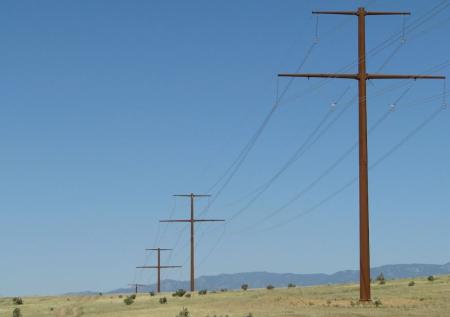Rights-of-way
The State Land Board accommodates rights-of-way on state trust land in a manner that minimizes encumbrances while preserving long-term real estate value, protecting natural values, allowing multiple uses and achieving appropriate returns. For questions or assistance, please contact David Rodenberg - Right-of-way and Tower Site Leasing Manager at 720-854-3328 (david.rodenberg@state.co.us).
Projects and Information
Q&A
Rights-of-way (ROWs) are used to accommodate encumbrances on trust land that are directly allowed under the terms of a contract. ROWs are most typically used for telephone and electrical lines, utility transmission corridors, oil and gas pipelines, and ditches.
The State Land Board will consider placing a ROW on state trust land when it can be done in a manner that minimizes long-term impacts, preserves real estate value, protects natural values, does not preclude or conflict with other uses, and results in an appropriate return to the Trusts.
The State Land Board's GIS Map Server can be used to locate state trust land.
A ROW application requires payment of a $500 application fee before it will be reviewed and processed.
A ROW also requires a consideration payment. A consideration payment is a single remittance, made in advance for the use of the trust lands for the entire term of the ROW contract. The consideration payment is invoiced by the State Land Board to the the applicant and is due once the contract has been signed. The minimum consideration payment for a ROW on state trust land is $5,000. See the State Land Board’s Fees & Payment Considerations schedule for details.
ROWs are granted for a specified term, typically 30 years.
A pre-application consultation with the Right-of-Way Manager is required. Prior to the meeting, the applicant should prepare a map that shows the location of the proposed ROW.
Following the pre-application consultation the applicant can submit an application for a Temporary Access Permit that will allow surveyors or other consultants required to complete due diligence to access the property. The temporary access permit request must be sent to the appropriate District Office with a copy to the Right-of-Way Manager. There are specific requirements for the Land Survey which must be met.
Once a completed application is received, the Right-of-Way Manager will evaluate the request and determine if the ROW can be approved by Staff or requires Board approval. In general, rights-of-way for public roads, utility transmission lines, and/or for terms longer than 30-years require Board approval. In addition, rights-of-ways that do not follow section lines or an existing right-of-way require Board review and approval.
If the application does not require Board review and approval, the manager will determine the consideration payment and prepare a contract for signature. Staff-approved applications generally take 30 days and Board approved applications generally take 60 days.
- $500 Application Fee
- The following documents may be submitted in digital or paper format.
- Complete Application Form
- Survey
- ESRI compatible shape files (with projection data)
- Metes and Bounds description (In MS WORD format if submitted a digital format)
- Applications, supporting documentation, and payments can be submitted through the State Land Board’s Customer Portal.
A restoration bond is required for ROWs. See the State Land Board’s Bonding FAQs for more information or contact the Right-of-Way Manager for details on specific requirements associated with performance bonds and insurance coverage.
Yes, the State Land Board has its own standard contract form.
If a ROW holder wishes to extend the contract, they must submit an application for renewal at least six months prior to the expiration date of the existing contract. Renewal applications are processed in the same manner as initial applications.
If the ROW holder does not wish to renew or continue the contract, they must notify the Board in writing at least six months prior to the expiration date of the ROW. Such notice shall address how and when all equipment will be removed and the premises restored to its original condition.
If the lessee fails to notify the Board of their intent to either extend or surrender the contract within the final six months of the contract term, all improvements located within the ROW will be deemed abandoned and may, at the Board’s option, be removed by the Board at the ROW holder’s expense, retained by the Board, or sold by the Board with all proceeds going to the Board.
Yes, there is a Rights-of-Way Contract policy adopted by the Board for this type of leasing. Please note, other Board policies may be applicable as well.
Unless subject to an exemption, the ROW application and any information provided to the State are subject to public release through the Colorado Open Records Act, § 24-72-201, C.R.S., et seq.
Forms and Instructions
- Right-of-way Application or submit your application online through the customer portal. Beginning 11/1/2025, online applications are preferred.
- Right-of-way Assignment Application or submit your application online through the customer portal. Beginning 11/1/2025, online applications are preferred.
Customer contact information
- You may update your email, address and phone number through your customer portal account. Select "Manage/Register an Account".
